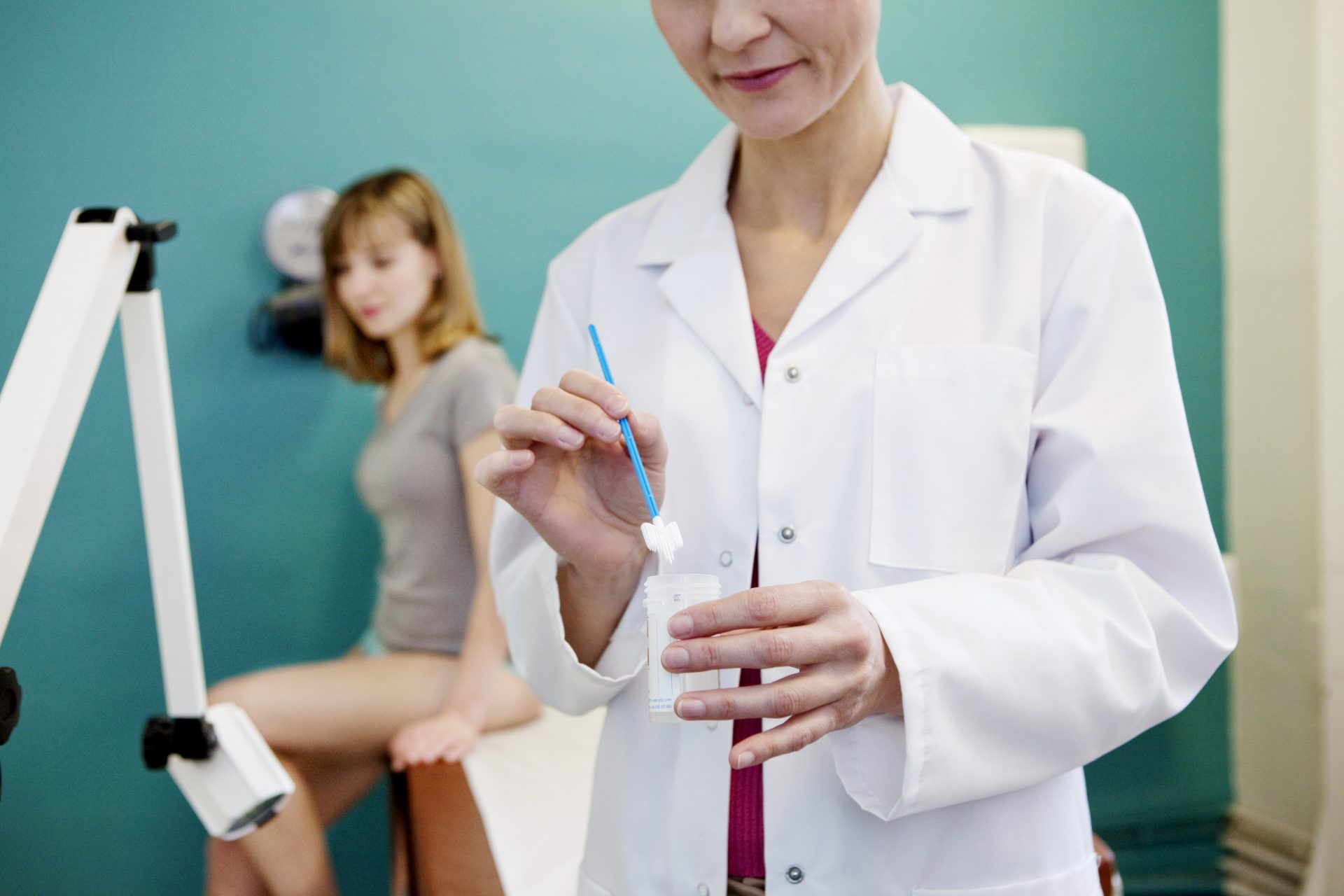Written by Lauren Geall
We all know how important smear tests are – but with so many appointments being cancelled as a result of the pandemic, way too many of us are skipping out on a procedure which could potentially save our lives. Here Katy, 29, who underwent treatment to remove cervical abnormalities in lockdown, tells Stylist her story to bring awareness to a reality which we so often ignore.
The first sign I had that something wasn’t right was in June, when I began to experience irregular bleeding. At that point, I had been struggling with urological problems for about a year and a half, and I had a six month period where I had a significant number of urinary tract infections, but I had seen various doctors about it and was given the all-clear.
But then in June, I noticed that I was having this irregular bleeding, and I was concerned about what was causing it because I knew I didn’t have any UTI’s. So I rang my GP and asked what could be causing it, and they referred me for a cervical smear and colposcopy.
Going into the process I was quite relaxed because I’m the daughter of a GP, so I knew a fair amount about cervical cancer and what a colposcopy would be. I thought it would be fine – that there would be an explanation for the bleeding and that would be it.

Three weeks after that initial chat with the GP I went for my first colposcopy. I had a chat with the doctor before the procedure and it was all very relaxed – he told me that, from what I had told him, everything would probably be fine. But then he found a lesion and told me he’d have to take a couple of samples. That was when things went from ‘probably fine’ to ‘oh no, this is serious’.
Over the next couple of weeks while I was waiting for the results I was worried that the doctor having found something could mean something very serious, especially after all the issues I’d had leading up to it. My mind went straight to cervical cancer. But fortunately, I have a very close and loving family and everyone was very supportive. I made sure to tell my friends about it too because I like to be very open about these kinds of things.
A couple of weeks later, I got a letter saying I had CIN3 cells – which means cell abnormalities – with a high chance of them altering. That was the moment where I thought ‘oh my gosh’; I’m HPV negative (I had the vaccine when I was 14) and it had been 18 months since my last smear which came back clear, so it had honestly never occurred to me that I could have anything actually wrong.
Although I have a relatively good knowledge and awareness of everything, I didn’t account for the effect that learning you have an abnormality has on you. I think everyone kind of expected that, after I’d been told it wasn’t cervical cancer and it could be treated, I’d magically feel great – but it didn’t happen like that at all. I actually spent a couple of weeks majorly freaking out and feeling quite low. The whole experience hit me a lot harder than I thought.
About three weeks later I got the letter to go to the hospital for treatment. My letter didn’t actually tell me what I was going to the hospital to have done, but I’d looked on the Jo’s Cervical Cancer Trust website and figured I’d be going for laser removal, which is actually what happened in the end.
At that point, I had this mixed feeling of “oh no, I’ve got to have an operation” vs “thank goodness it’s not cancer”. And then I was also worried about how it would feel and how I would recover – I had to have time off work and you’re not allowed to have sex for four to six weeks.
One thing I wasn’t that worried about, though, was picking up Covid-19 during my treatment. The first time I went to the hospital for my colposcopy it was so spotless you could have eaten off the floor, so after that experience, I felt really comfortable with the idea of going back because all the extra safety measures they have in place reassured me.
I feel lucky to be able to say that, after the treatment, I’m now all clear – I’ve had no aftereffects. Straight after the operation wasn’t exactly comfortable, but I’ve recovered now. I’ve got to have a smear test in six months and then after that it will be back to the usual routine.
Going through this process may have been scary and uncomfortable at times, but it’s important to do because if I had waited a couple of years, who’s to say I wouldn’t have been one of the people who does get diagnosed with cancer? It’s so important that women go to their doctors if they think something is off because cervical cancer is a relatively common cancer for women in their fertile years, and unfortunately, it can be fatal.
This isn’t something that if you pretend it doesn’t exist it will go away. I feel really very fortunate that I was able to be treated and looked after so well and so quickly – I count myself one of the lucky ones.
Your most common cervical screening questions, answered

Unsure about what constitutes ‘abnormal’? Worried about attending a cervical screening appointment during the coronavirus pandemic? We asked an expert some of your most commonly asked questions – here, Imogen Pinnell, health information manager at Jo’s Cervical Cancer Trust, gives us the answers you’ve been looking for.
What are the key symptoms of cervical cancer to be on the lookout for?
The most common symptom of cervical cancer is bleeding which is unusual for you. That could mean bleeding in between periods, after sex, or after the menopause. Other things to look out for are: changes to vaginal discharge, unexplained pain in your lower back or pelvis, and pain during sex.
What should you do if you think something’s wrong?
Whether you’re up to date with your cervical screening appointments, you’re waiting for an appointment or you’ve never been – if you are having symptoms of cervical cancer, book an appointment to see your GP and tell them what’s happening. These symptoms are really common and they are unlikely to be cervical cancer, but they’re always something you need to tell a healthcare professional about.
How are cervical screening appointments different during the coronavirus pandemic?
The test itself will be exactly the same – the only change is that the nurse or doctor taking the test might wear more PPE than usual. Your GP surgery has safety measures in place to keep you, and their staff, safe. These might include temperature checks, asking you to wait outside the surgery rather than in the waiting room, or asking you to wear a face covering. It’s important to say that if your GP has invited you to have cervical screening, that means it’s safe to go!
How long will it take to get results back?
You should receive your results within 4 weeks, although we know delays happen. If you haven’t heard within 4 weeks, you can ask your GP surgery when to expect them.
What will happen next if something is wrong?
Most results will be clear. However, if you get a result which is abnormal, try not to worry. Depending on your results, you may be asked to come in for a further check-up called a colposcopy, where a doctor has a closer look at your cervix.
For more information on cervical cancer, including how and when to book a smear test, you can check out Jo’s Cervical Cancer Trust or visit the NHS website.
Images: Getty/Supplied by Katy
Source: Read Full Article






